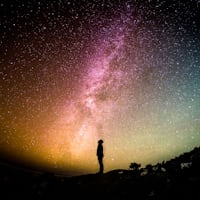Years ago, I was waiting tables for a spaghetti dinner — a fundraiser for the church put on by our men’s group. As I refilled water glasses, an older woman with lots of red lipstick and L’Oreal’s best black hair asked if she could talk with the pastor.
I wiped my hands on my apron and admitted that I was the pastor.
“Could I ask you a question?” She said timidly.
I suspected I was the first clergyperson she had ever spoken to, so I encouraged her to ask whatever she wanted.
She asked, “When we get to heaven, will we be able to go out to eat? I like going out to eat and hope I can still do it in heaven.”
I didn’t know what to say at first. When telling this story to friends, I ask, “Where were Paul Tillich and Karl Barth when I needed them?” And people who know who Paul Tillich and Karl Barth were laugh uproariously.
I’m proud to say that the earnestness in her voice kept me from laughing at her. Although I suppressed a grin when I pulled an old sermon illustration out of my brain’s back pocket:
“You know, the Bible doesn’t say a lot about heaven. It is kind of like trying to describe Florida to an Eskimo without the aid of pictures. You couldn’t convey palm trees and warm sunny beaches. You could only talk about what isn’t there: no ice and snow, no polar bears, or blizzards. Most of what the Bible says about heaven is what isn’t there: no pain, no mourning, no crying, or death. But, it does assure us that heaven is good.”
I was pretty proud of that.
I now know that I got things backward. She was teaching me. Not the other way around.
The woman’s question and my response illustrate a problem all religions have. The mystics, theologians, and religious professionals monopolize the faith. They have the visions, create the philosophical systems, and perform the rituals. They often give the impression that you have to be inclined to meditate and pray for hours. You have to have a vocabulary that includes words like “eschaton,” “numinous,” and “ontological.” And you need to be able to calculate the dates of Rosh Hashana, Easter, or Eid in your head to be religious.
So where does that leave the lady who wanted to go out to eat in heaven? It leaves her in a category we professionals call “the laity,” whom we “serve” if they are pious enough to sit at our feet and absorb our wisdom.
But this lady didn’t even come to church unless we were serving a delicious spaghetti dinner for even less money than Denny’s early-bird special. What about her?
Well, who do you think Hell is for?
I am ashamed to say that I used to think that this religious caste system was real. I, of course, was deeply concerned about those who were “lost.” I did everything I could to “save” them by getting them to come to church.
In reality, I was the one who was lost — lost in the clouds of theology, biblical studies, and religious ritual, stuff that can be helpful if, in the end, it comes down to earth where people really live.
Thank God that religion isn’t left only to us religious professionals. Occasionally, religions produce Great Souls who bypass the pros to bring faith down to earth.
One of those Great Souls was Francis of Assisi, who helped ordinary people in the 1200s CE understand the most difficult Christian doctrine, Incarnation: the claim that God became human in Jesus of Nazareth.
The theologians who are way higher up on the Christian caste system than I am have come up with ways that try to express what we mean by Incarnation:
We believe in one Lord, Jesus Christ,
Nicene Creed
the only Son of God,
eternally begotten of the Father,
God from God, Light from Light,
true God from true God,
begotten, not made,
of one Being with the Father.
Through him all things were made.
For us and for our salvation
he came down from heaven:
by the power of the Holy Spirit
he became incarnate from the Virgin Mary,
and was made man.
Francis could recite these words in Latin and did so every time he went to Mass, and maybe he found them meaningful. But to most people, that theology is made from the same fabric as the Emperor’s new clothes.
Francis found another way to teach the Incarnation to ordinary people. He lived it. That means he lived, as much as possible, like Jesus. Like Jesus, he depended on the generosity of others to give him his daily bread, believing in a God who loved him as much as the birds of the air who neither sow nor reap. He did not have a closet full of clothes because he trusted a God who clothes the lilies of the field. Maybe he couldn’t heal lepers like Jesus, but he could embrace them.
When people saw Francis, they saw what Jesus looked like. When people saw Jesus, they saw what God looks like.
That is tough for us. Jesus lived in a world where people thought God was like Caesar.
Francis lived in a world where people thought God was like a King or the Pope, who was even more powerful than kings at that time.
Today, many people believe they see God in a billionaire who lives in Mar-a-Lago and is a once-and-future POTUS.
But God is like Jesus, and Jesus is like Francis, and Francis is like you or me when we are most open-hearted and vulnerable.
Every year, when Christmas comes around, we have a chance to understand Incarnation again. We can see God when we look in the manger.
We don’t put up a tree at our house. We hang a quilted one on our dining room wall thanks to Jacquie’s sister, Joanne. And on the sideboard beneath it, we arrange a motley manger scene. Most of the characters were carved from thorns by an artist in Nigeria, where my aunt served as a missionary. But there is also a silver elephant from India.
When our boys were small, we had wooden figures created by Fisher-Price. They spent the month of December rearranging them every day. As soon as they grow to be too big to fit in a manger themselves, kids understand, as they look down on the scene like angels, what the scene is telling us:
God is here
In the messiness of birth.
In the love of the two people who gave him life.
With the cow, sheep, donkey, camels, (and elephant.)
And we take our cues from the shepherds and kings who bow down before him in love and wonder — the same love and wonder we feel in the presence of every new baby.
If I had been looking in the manger instead of up at the heavens that evening when the lady asked me if we would be able to go out to eat in heaven, I would have remembered a story that begins: “The kingdom of heaven may be compared to a king who gave a wedding feast for his son.” It goes on to say the people you would imagine a king would invite to the feast were all too busy to come. So, the king had his servants go out and pull people off the highways and byways to join the feast.
In other words, the answer to the woman’s question was right in front of her — and right in front of me — in that plate of spaghetti set on a paper-covered folding table where she sat with her friends on each side of her and had a lively conversation with people sitting across from her whom she just met. That’s heaven. In fact, it’s where people who never darkened the door of a church get waited on by pastors who fill their water glasses and take their orders (meat sauce or mushroom?) — and the creators of the Nicene Creed wash the dishes.
When we look in the manger and see God wrapped in swaddling clothes, we begin to see God in the birds of the air and the lilies of the field, in animals, in young lovers and old ones, too. We are in heaven when we share our deepest hurts and greatest joys with a friend or vice versa. Even a small piece of bread and a sip of wine can tell us who God is, why we are here, and where we are going better than all the theologians in the world.
So, Merry Christmas.
Testimonials
Our Customers Said




★ ★ ★ ★ ★
4.85 from 1,300+ reviews
“Delizioso”
A must try for all Italian food lovers! The best Italian restaurant I’ve ever been to! Highly recommended!
★ ★ ★ ★ ★
— Martha Nazario
“Authentic Flavour”
The pasta dishes are cooked to perfection and the sauces are full of flavour. Highly recommend!
★ ★ ★ ★ ★
— Alex Martinez
“Outstanding Pizza”
The crust is thin, the sauce is flavourful and the toppings are very fresh. Will come again for sure.
★ ★ ★ ★ ★
— Antoine Crawford
Have Questions?
Frequently Asked
Questions
Is there a free trial available?
Yes, we offer a free trial period of 14 days. During this period, you will have full access to all of our features and services.
Can I change my plan later?
Yes, you can upgrade or downgrade your plan at any time. You can also switch between monthly and yearly plans.
What is your cancellation policy?
You can request a refund within 14 days of your purchase. Contact us and we will process your refund.
How does billing work?
We have a simple billing system which allows you to pay for services on a monthly or yearly basis.
How do I change my personal info?
You can update name, email address and other personal information from the “Settings” section.
Can I get an invoice for my purchase?
Yes, you can. Please contact our customer support and provide your purchase number.
Need more information?
Struggling to find the answers you need? Let’s have a conversation.


